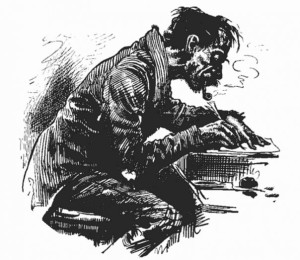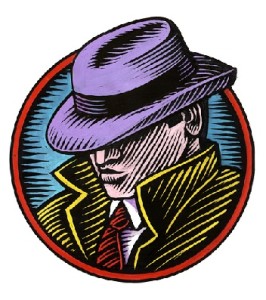Our first page today comes from a novel called Things Unseen. My comments on the other side:
At the southeastern edge of California, there’s a slice of land the color of desolation. The air is staler than a week-old bread crust and drier than a burnt piece of toast. It’s a place like a daydream, suspended between consciousness and slumber. Like dawn, or sunset—a place of transitions. For over fifty years, one man had called this place home. I was on my way to meet him.
“Oriana,” I addressed myself aloud, “you’ve run out of gas.” I sat back from the wheel of my dad’s ‘95 Toyota Camry and imagined my existence fading across the desert landscape. I could see the Camry’s sand-colored exterior melting into an unpaved expanse. “Twenty miles from her destination, young woman collapses in the heat of the Mojave summer.” That would make great fodder for one of my novels. I lifted my gallon water bottle from the passenger’s seat and took a long drink. You needed water in the desert, but extra gas would have been nice, too. I stepped outside and surveyed the low mountain range ahead. The last station was fifty miles back. I should have known to stock up on gasoline. My family used to come out here every summer, after all.
I jumped at the sound of my cell beeping from my pants pocket. Low battery, huh? Even if I could get service out here, who would I call? 911? That rundown gas station? The National Park Service? No one would ever pass by here, except for that man, maybe. No one would—
Something glinted ahead, like the flash of metal beneath the sun. A mirage? It was heading in my direction. It moved quickly across the flat land at the foot of the mountains, morphing from a distorted ripple to a human form—on a bicycle?
A boy, about eleven or twelve, pedaled up to the front of the car. A veil of t-shirts shaded his face and neck. He got down from his bike, walked over to the open window by the driver’s seat, reached in with his right hand, and switched on the ignition. I just stood there, watching. I’ve been saved. He turned off the ignition and towards me. “Out of gas?” he said, lifting his headgear.
***
- Opening with a description
There’s a meme going around that you shouldn’t open your novel with a physical description. I don’t see anything wrong with it, so long as you make it clear it’s coming from a character’s perspective and there is some sort of disturbance involved.
Here we have a woman who has run out of gas in the desert, only we don’t know that until the next paragraph. The first paragraph ends with For over fifty years, one man had called this place home. I was on my way to meet him.
The problem I have with that is it isn’t disturbing. It doesn’t portend trouble or change or challenge. She could be going to see this man for tea.
If you were to keep the opening paragraph, and describe the desert and desolation, why not end the graph with: And I was out of gas.Then you’ve got an immediate sense of trouble.
But I would advise the author to reformulate the opening paragraph into action showing us the car running out of gas. Get that in early, give us the character, then bring in the setting.
- 1 + 1 = 1/2
This formula comes from Sol Stein, the noted writing teacher and editor. What it means is that two descriptions of the same thing don’t strengthen the effect, but dilute it.
In the first paragraph we have this: The air is staler than a week-old bread crust and drier than a burnt piece of toast.
That’s two similar descriptions. But they make the reader hold both simultaneously, and that takes away from the power of either.
So a simple rule is: don’t describe the same thing in two different ways in the same sentence. Choose one, the best one. Personally, I’d go with burnt piece of toast because burning goes with the desert effect you’re trying to establish.
But the first paragraph also gives us other desert descriptions: color of desolation, daydream, dawn, sunset. This comes close to fiction writing blunder #21 (as explained in my book 27 Fiction Writing Blunders – And How Not To Make Them!)––being too in love with lyrical. Readers don’t often connect with a lyrical opening or passage, unless it is so dang good it cannot be resisted (like the opening of Ken Kesey’s saga, Sometimes a Great Notion).
So major in action and disturbance in the opening.
- Attitude adjustment
When using First Person POV, it’s crucial to establish a discernable attitude from the get-go. Readers love a character who has some ‘tude, who has blood coursing through her veins. They want to hear a distinct voice. Like Stephanie Plum’s in Janet Evanovich’s High Five:
When I was a little girl I used to dress Barbie up without underpants. On the outside, she’d look like the perfect lady. Tasteful plastic heels, tailored suit. But underneath, she was naked. I’m a bail enforcement agent now—also know as a fugitive apprehension agent, also knows as a bounty hunter. I bring ‘em back dead or alive. At least I try. And being a bail enforcement agent is a little like being bare-bottom Barbie. It’s about having a secret. And it’s about wearing a lot of bravado on the outside when you’re really operating without underpants.
My advice to the author would be to spend some time really getting to know your character’s voice. Delve deep into her background and wounds and strengths and fears and yearnings and drive. Give her a real attitude about running out of gas. Get her angry about it. Show us more emotion. Re-write this opening page until it is soaked with voice and attitude.
- White space
A purely practical matter: most readers these days don’t respond well to long blocks of text. Your first two paragraphs should be four or five. It’s not hard to do, and it makes things easier on the reader.
- The boy on the bike
Here is where you can inject more attitude. Why does Oriana just stand there while a boy walks over and reaches into her car? This is a perfect time for an argument.
“Get away from my car!”
“You wanna die, lady?”
“Now!”
“You gonna shoot me or something?”
In other words, conflict. It’s basic, but so often writers leave it out in the opening pages. They set things up, describe landscapes and situations, and it’s only later that another character comes into the proceedings, and even then it might be a friend or ally and it’s Happy People in Happy Land (writing blunder #10).
I’m going to leave off here and let others weigh in, but I want to give this author a bit of good news. Your ability to write coherent sentences in a logical flow is sound. That’s not something easily developed or taught if it isn’t there in the first place.
So now it’s a matter of craft, which can be taught. I’ve given you my view of your first page, and now it’s time for others to do the same.
But I will say that a woman out of gas in the desert is a great opening disturbance. Work this page until is vibrates with attitude and emotion and conflict. Cut all flab. Do that, and I’ll want to go on to page 2.






